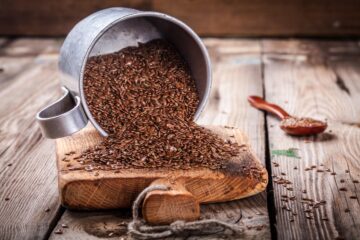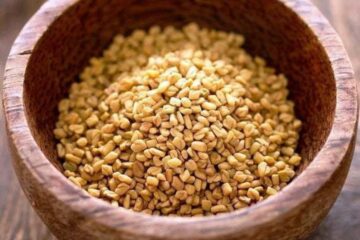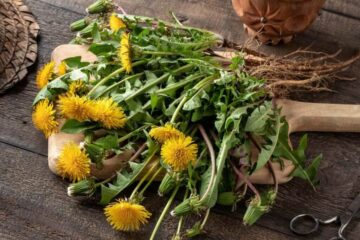Name:
Ginseng refers to several species within the Panax genus, most notably Panax ginseng (Asian or Korean ginseng) and Panax quinquefolius (American ginseng).
Description:
Ginseng plants are perennial herbs standing between 0.6 and 0.75 meters tall. Their compound leaves comprise 5 oval-shaped leaflets each. The plant produces small, greenish-white flowers and yields red berries. The plant’s fleshy, human-like root is its most distinctive feature.
Medicinal Uses of Ginseng:
- Cognitive Function: Ginseng has been studied for its potential effects on cognitive function. A review of nine clinical trials published in the Journal of Ginseng Research suggests that ginseng might improve cognitive performance in healthy individuals and also help those with Alzheimer’s disease. The review notes, however, that larger and more rigorous studies are needed to confirm these effects (Journal of Ginseng Research, 2016, https://www.sciencedirect.com/science/article/pii/S1226845316300509).
- Immune System Support: Several studies have suggested that ginseng may enhance immune function. For example, a study from the Pusan National University in South Korea found that red ginseng can enhance the immune response to influenza vaccine. In this randomized, double-blind, placebo-controlled trial, 100 healthy participants received either ginseng or a placebo. The group taking ginseng had a higher antibody response to the vaccine (Journal of Medicinal Food, 2012, https://www.liebertpub.com/doi/10.1089/jmf.2011.2173).
- Cardiovascular Health: Ginseng has been investigated for its potential cardiovascular benefits. In a study from Seoul National University Hospital, 78 patients with high blood pressure were given either ginseng or a placebo for eight weeks. The patients receiving ginseng experienced a significant reduction in blood pressure. The authors suggested that the benefits might be due to ginseng’s antioxidant properties (American Journal of Chinese Medicine, 2014, https://www.worldscientific.com/doi/abs/10.1142/S0192415X14500343).
- Blood Sugar Control: Ginseng may have potential benefits for blood sugar control. A systematic review and meta-analysis conducted by researchers at the University of Toronto found that both American and Korean ginseng could help lower fasting blood glucose in people with and without diabetes. The review included 16 randomized controlled trials with a total of 770 participants (PLOS ONE, 2014, https://journals.plos.org/plosone/article?id=10.1371/journal.pone.0097749).
- Fatigue Reduction: Ginseng may also be helpful in reducing fatigue. A clinical trial conducted by Mayo Clinic involving 364 cancer survivors suffering from fatigue found that a daily dose of 2000 mg of American ginseng over two months resulted in a significant reduction in overall fatigue and interference with activity compared to the placebo group. Researchers concluded that ginseng might represent an effective treatment option for fatigue, but more research is needed to validate these findings (Journal of the National Cancer Institute, 2013, https://academic.oup.com/jnci/article/105/16/1230/2517808).
- Menopausal Symptoms: There is evidence suggesting that ginseng might alleviate menopausal symptoms. A study from the Department of Obstetrics and Gynecology at Ajou University School of Medicine in South Korea showed that women taking red ginseng showed improvements in menopausal symptoms compared to the placebo group. The study, however, highlighted the need for more rigorous trials to validate these findings (Menopause, 2012, https://journals.lww.com/menopausejournal/Abstract/2012/04000/Effects_of_Korean_red_ginseng_on_genital.11.aspx).
- Mental Health Benefits: Ginseng has also been investigated for its potential effects on mental health, particularly in reducing stress and enhancing mood. A study from Brain Disease Research Center at Ajou University School of Medicine in South Korea demonstrated that participants who consumed ginseng exhibited lower levels of stress hormones and reported less anxiety compared to those who consumed a placebo (Journal of Ginseng Research, 2013, https://www.sciencedirect.com/science/article/pii/S122684531300009X).
Origin and Distribution:
Native to the cool, temperate forests of North America and Eastern Asia, ginseng is presently cultivated widely in Korea, China, Canada, and the United States.
Cultivation and Care:
Ginseng thrives best in well-drained, loamy soil under partial shade. It requires ample water, but the roots should not be waterlogged. Ginseng plants take between 4 to 6 years to mature enough for their roots to be harvested.
Harvesting and Storage:
Harvesting typically takes place during fall when the leaves have turned yellow. The roots are gently unearthed, cleaned, then dried in the sun or air. Properly dried ginseng can be stored for several years.
Uses:
Culinary Uses: Ginseng root is used in a variety of culinary applications, from soups and teas to flavoring liqueurs.
Medicinal Uses: Ginseng has a long history of use in traditional medicine. It is believed to aid cognitive function, immune response, cardiovascular health, among others, based on scientific research and traditional usage. More research is needed to confirm these effects (National Institutes of Health, 2021).
Other Uses: Ginseng extract is often used in skincare products due to its purported anti-aging properties.
Safety Information:
Most people can safely use ginseng when used appropriately, but it can cause side effects like headaches, sleep problems, and digestive issues. Certain medications, including warfarin and antidepressants, can interact with ginseng (National Institutes of Health, 2021).
Historical and Cultural Significance:
Ginseng has played a significant role in traditional Chinese medicine and was also used by Indigenous peoples in North America. Its root’s human-like shape led to beliefs in its “restorative” powers.
Conservation Status:
Wild ginseng is considered “endangered” in some regions due to overharvesting and habitat loss. Cultivation is encouraged to preserve wild populations, and trade of wild ginseng is regulated by the Convention on International Trade in Endangered Species (CITES) to protect the species (CITES).




